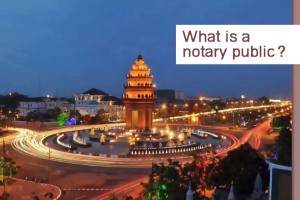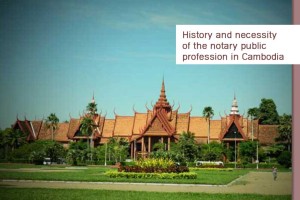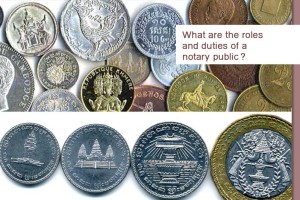1. What is a notary public?
A notary public is a public officer in charge of authenticating documents, certifying their dates, receiving and maintaining their submission and delivering copies of such authenticated documents.
In this regard, the term ‘public officer’ refers to a certain category of legal professionals who are vested with authority to authenticate and draft certain documents and agreements. A notary public conducts his or her duties within the premises of his registered office in accordance with his or her code of conducts and professional liabilities rules. In addition, ‘public officer’ exercises his or her function, in personal capacity.
Contrary to other legal professionals, a notary public does not only protect the legal interests of his or her clients. In his or her capacity as a public officer, a notary public is obligated to ensure independence and impartiality vis-à-vis the opposing parties, compliance with the rule of law and confidentiality.
The implementation of the notary public profession in Cambodia will certainly contribute to the development of the rule of law of Cambodia, which remains quite underdeveloped, as well as to reduce legal conflicts, especially in the real estate sector in Cambodia.
2. History and necessity of the notary public profession in Cambodia
Established in Europe, the Middle East and Egypt for thousands of years, the notary public profession appears, in the Cambodian population’s view, to be a ‘novel’ profession despite the fact that it has been introduced in Cambodia since 1954 under the influence of the French protectorate. This brand new profession started to crumble during the 1970’s prior to its complete abolishment in 1975 to pave the way for the communist Khmer Rouge regime.
After the civil war, none of the surviving notary public had been identified in Cambodia. As such, the authentication of documents as well as their certification has since been transferred to the local authorities and several other governmental authorities.
It was not until 2001, 26 years after the Khmer Rouge, that the first notary public was nominated by way of a Sub-Decree notwithstanding the fact that the notary public statute and the code of conduct were still nonexistent.
In the context of legal and judicial reform, the notion of having a notary public has been re-introduced and imprinted in the new 2006 Civil Procedure Code and the new 2007 Civil Code. These codes require that documents for certain transactions, notably those related to real estate and commercial transactions, be drafted or authenticated by a notary public.
Despite the fact that the statute and code of conduct concerning the notary public profession have yet to be enacted, in 2008 the Royal Government of Cambodia, taking into account the importance of the notary public profession in the establishment of legal security in the relationships between individuals and property and, in particular, to comply with the codes mentioned in the above paragraph, has commenced to accept enrolment applications for notary public study and simultaneously nominated certain officers as notaries public who are entrusted with roles that are aligned with those undertaken by a notary public in France. Among the newly trained notary public professionals, our Phnom Penh Notary Public (or the Etude Notariale de Phnom Penh, in French) was established by Sub-Decree 138 dated 1 October 2015.
Looking at the experiences in France, where a large majority of the population entrust their legal work to a notary public, several reports show that “legal documents and agreements established by (French) notary public are rarely subject to any conflicts. Based on the 2006 statistic, French notary public drafted four million and fifty thousand legal documents of which only 0.1% (or 1 out of 1,000) are disputed.” This data reinforces the need to establish this legal profession in Cambodia.
3. What are the roles and duties of a notary public?
According to the laws and regulations in force, the notary public is vested with extensive powers. In addition to certain legal transactions which are subject to the review of notary public, as opposed to any other legal professional (e.g. all such agreements involving the transfer of ownership of real estate, wills, secured hypothec etc.), assistance of a notary public is equally necessary for other operations, such as certification of signatures and fingerprints required by certain governmental authorities. It is noteworthy that legal documents or agreements drafted or authenticated by a notary public will have conclusive force and certify a specific date.
One of the roles of a notary public is to draft and authenticate documents with the aim of ensuring balance, efficiency and legal security. A notary public also offers customized legal advice, coordination with other legal professionals and maintains, on behalf of the clients, legal documents drafted by them.
At present, Cambodian notary public has territorial authority within the Kingdom of Cambodia.



